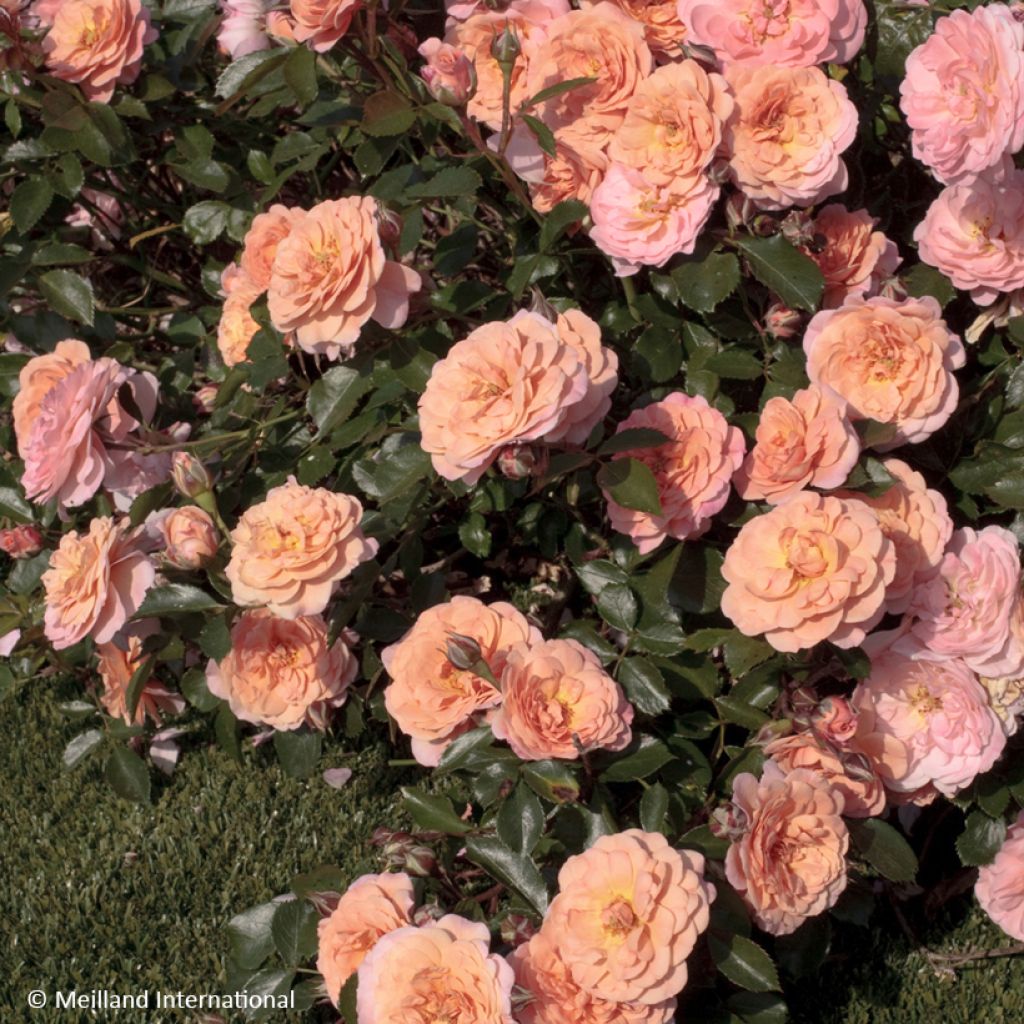

Rosa Apricot Drift - Groundcover Rose
Rosa Apricot Drift - Groundcover Rose
Rosa 'Meimirrote' APRICOT DRIFT®
Groundcover Rose
Special offer!
Receive a €20 voucher for any order over €90 (excluding delivery costs, credit notes, and plastic-free options)!
1- Add your favorite plants to your cart.
2- Once you have reached €90, confirm your order (you can even choose the delivery date!).
3- As soon as your order is shipped, you will receive an email containing your voucher code, valid for 3 months (90 days).
Your voucher is unique and can only be used once, for any order with a minimum value of €20, excluding delivery costs.
Can be combined with other current offers, non-divisible and non-refundable.
Why not try an alternative variety in stock?
View all →This plant carries a 6 months recovery warranty
More information
We guarantee the quality of our plants for a full growing cycle, and will replace at our expense any plant that fails to recover under normal climatic and planting conditions.

Description
The Groundcover Rose Apricot Drift® is a compact and floriferous variety perfectly suited to beds, borders, rockeries, and containers. Part of the Drift® range by Meilland Richardier, it stands out for its continuous and abundant flowering from spring until the first frosts. Its fully double flowers measuring around 5 cm in diameter display an apricot-peach hue that evolves into rosy tones as they bloom, adding subtle variations to floral arrangements. With a low, rounded, and spreading habit, this rose effectively covers the ground while maintaining a harmonious shape.
Belonging to the Rosaceae family, the Apricot Drift 'Meimirrote' rose is a modern hybrid selected for its moderate growth and long-lasting flowering. It forms a low, spreading bush reaching 40 to 50 cm in height and 40 to 50 cm in width, enabling it to quickly cover the ground. Its short, ramified stems develop rapidly and produce numerous floriferous shoots, ensuring a dense and compact effect. The fully double, turbinate flowers measuring about 5 cm in diameter consist of approximately 50 to 55 petals arranged in an open, slightly ruffled corolla. They display an apricot-peach hue upon opening and then evolve into rosier and salmon tones in a subtle gradient. This flowering begins in spring and renews in successive waves until the first frosts, ensuring continuous blooms in the garden. The deciduous foliage formed of small, glossy, dark green leaves is dense and covers the branches well, maintaining a tidy appearance even after flowering. Thanks to its high disease resistance, particularly powdery mildew and black spot, this rose remains vigorous without requiring any specific chemical treatments. Its hardiness down to -18°C enables it to adapt to regions with moderate to cold winters. Unlike some groundcover roses with a more spreading habit, the Apricot Drift maintains a homogeneous and well-structured silhouette, minimising maintenance requirements.
This low-maintenance Apricot Drift Rose adapts to a wide range of soils provided that they are well-drained. It prefers a full sun exposure but can tolerate light partial shade in hot climates. Its upkeep is minimal. With its warm apricot hue, it pairs beautifully with plants in pastel or cream tones such as light pink shrub roses or hardy geraniums (‘Brookside’, ‘Orion’). It also pairs wonderfully with catmints or lavenders, creating an elegant contrast between a grey-green foliage and bright flowers. In rockeries, it can be planted alongside sedums, euphorbias, and yarrows, enhancing a natural, cottage-garden effect. Along pathways or hedges, it forms a dense, harmonious floral ribbon that elegantly brings structure to the space. On a patio or balcony, in pots or containers, it offers abundant, trailing blooms perfect for enlivening small areas. Planted in groups of three to five, it will effectively cover the ground and ensure a spectacular floral display throughout the season.
Report an error about the product description
Plant habit
Flowering
Foliage
Botanical data
Rosa
'Meimirrote' APRICOT DRIFT®
Rosaceae
Groundcover Rose
Rosa APRICOT DRIFT
Cultivar or hybrid
Planting and care
To plant your Apricot Drift rose, prepare the soil to a depth of 25 cm, breaking up the earth well and adding a base fertiliser such as dried blood or dehydrated horn at the bottom of the planting hole. Position your plant after removing it from its pot, covering the top of the root ball with 3 cm of soil, backfill and water thoroughly to remove any air pockets. In dry weather, water regularly for a few weeks to encourage root development. Also consider feeding your rose with a special rose fertiliser to promote flowering. Naturally disease-resistant, it does not require fungicidal treatments.
Roses often develop spots or look unsightly by late summer, but this does not affect their growth. These spots are not harmful to the rose and are a natural occurrence. Follow all our advice to remedy this and read our article: Help: My Roses Have Spots
Planting period
Intended location
Care
This item has not been reviewed yet - be the first to leave a review about it.
Haven't found what you were looking for?
Hardiness is the lowest winter temperature a plant can endure without suffering serious damage or even dying. However, hardiness is affected by location (a sheltered area, such as a patio), protection (winter cover) and soil type (hardiness is improved by well-drained soil).

Photo Sharing Terms & Conditions
In order to encourage gardeners to interact and share their experiences, Promesse de fleurs offers various media enabling content to be uploaded onto its Site - in particular via the ‘Photo sharing’ module.
The User agrees to refrain from:
- Posting any content that is illegal, prejudicial, insulting, racist, inciteful to hatred, revisionist, contrary to public decency, that infringes on privacy or on the privacy rights of third parties, in particular the publicity rights of persons and goods, intellectual property rights, or the right to privacy.
- Submitting content on behalf of a third party;
- Impersonate the identity of a third party and/or publish any personal information about a third party;
In general, the User undertakes to refrain from any unethical behaviour.
All Content (in particular text, comments, files, images, photos, videos, creative works, etc.), which may be subject to property or intellectual property rights, image or other private rights, shall remain the property of the User, subject to the limited rights granted by the terms of the licence granted by Promesse de fleurs as stated below. Users are at liberty to publish or not to publish such Content on the Site, notably via the ‘Photo Sharing’ facility, and accept that this Content shall be made public and freely accessible, notably on the Internet.
Users further acknowledge, undertake to have ,and guarantee that they hold all necessary rights and permissions to publish such material on the Site, in particular with regard to the legislation in force pertaining to any privacy, property, intellectual property, image, or contractual rights, or rights of any other nature. By publishing such Content on the Site, Users acknowledge accepting full liability as publishers of the Content within the meaning of the law, and grant Promesse de fleurs, free of charge, an inclusive, worldwide licence for the said Content for the entire duration of its publication, including all reproduction, representation, up/downloading, displaying, performing, transmission, and storage rights.
Users also grant permission for their name to be linked to the Content and accept that this link may not always be made available.
By engaging in posting material, Users consent to their Content becoming automatically accessible on the Internet, in particular on other sites and/or blogs and/or web pages of the Promesse de fleurs site, including in particular social pages and the Promesse de fleurs catalogue.
Users may secure the removal of entrusted content free of charge by issuing a simple request via our contact form.
The flowering period indicated on our website applies to countries and regions located in USDA zone 8 (France, the United Kingdom, Ireland, the Netherlands, etc.)
It will vary according to where you live:
- In zones 9 to 10 (Italy, Spain, Greece, etc.), flowering will occur about 2 to 4 weeks earlier.
- In zones 6 to 7 (Germany, Poland, Slovenia, and lower mountainous regions), flowering will be delayed by 2 to 3 weeks.
- In zone 5 (Central Europe, Scandinavia), blooming will be delayed by 3 to 5 weeks.
In temperate climates, pruning of spring-flowering shrubs (forsythia, spireas, etc.) should be done just after flowering.
Pruning of summer-flowering shrubs (Indian Lilac, Perovskia, etc.) can be done in winter or spring.
In cold regions as well as with frost-sensitive plants, avoid pruning too early when severe frosts may still occur.
The planting period indicated on our website applies to countries and regions located in USDA zone 8 (France, United Kingdom, Ireland, Netherlands).
It will vary according to where you live:
- In Mediterranean zones (Marseille, Madrid, Milan, etc.), autumn and winter are the best planting periods.
- In continental zones (Strasbourg, Munich, Vienna, etc.), delay planting by 2 to 3 weeks in spring and bring it forward by 2 to 4 weeks in autumn.
- In mountainous regions (the Alps, Pyrenees, Carpathians, etc.), it is best to plant in late spring (May-June) or late summer (August-September).
The harvesting period indicated on our website applies to countries and regions in USDA zone 8 (France, England, Ireland, the Netherlands).
In colder areas (Scandinavia, Poland, Austria...) fruit and vegetable harvests are likely to be delayed by 3-4 weeks.
In warmer areas (Italy, Spain, Greece, etc.), harvesting will probably take place earlier, depending on weather conditions.
The sowing periods indicated on our website apply to countries and regions within USDA Zone 8 (France, UK, Ireland, Netherlands).
In colder areas (Scandinavia, Poland, Austria...), delay any outdoor sowing by 3-4 weeks, or sow under glass.
In warmer climes (Italy, Spain, Greece, etc.), bring outdoor sowing forward by a few weeks.







































